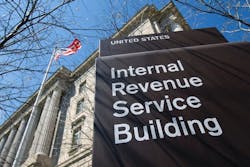The most common tax filing mistake for drivers is not filing taxes
"The most common tax filing mistake that drivers make is not filing their taxes at all," says Jim O'Donnell, CEO and founder of Trucker Tax Service. "I don’t know what the percentage is but it’s absolutely massive on drivers who don’t file at all. They come off the road, finally have a chance to be with their family or friends or simply relax, and the last thing they want to think about is filing taxes."
O'Donnell currently is working with a company driver from North Carolina who hasn't filed taxes in five years. "They’re [North Carolina] garnishing his wages, saying he owes $5,000 in taxes. It’s absolutely ridiculous, because if he would have filed his tax return on time he probably would've gotten money back."
The state says he owes $2,000 from 2011 and with interest and the penalties over the years, it’s more than tripled. "It’s two and a half times the amount they say he owed, which in reality he never owed in the first place. They probably owed him," says O'Donnell.
He adds that the IRS most likely hasn't contacted the driver because they owe him money. "They’re not going to knock down your door, and say 'by the way, we owe you money.' If it was the other way around, and he owed them money, they'd be coming after him in a big way."
Most fleet drivers do get tax refunds, according to O'Donnell, because of their per diem payments from the carrier against their expenses. (For more on per diem and taxes see "The biggest tax mistake fleet drivers make." Drivers don't have to declare these per diems, but if they don't, they can't itemize deductions against it. For example, deductions for a cell phone can hit $1,500 a year and even smaller on-the-road expenses like packets of batteries, paper towels and air fresheners can add up over a year's time. "By not keeping these small receipts and logging the costs in a notebook it can cost a driver thousands of dollars annually,” he explained. "It depends upon the driver, but on average every dollar that they put down in the form of a deduction typically comes back to them in about 20 cents worth of refund."
More importantly, O'Donnell says that itemizing expenses may move drivers into a lower tax bracket, which offers even greater savings. "Let’s say a driver grosses $40,000. Once they take away their per diem, which can be pretty significant like $15,000, and then another $3,000 of itemized expenses, then suddenly their taxable income has dropped almost in half. It’s now $22,000. So now they’ve paid [withholding] taxes based on 40 percent, but they’re only getting taxed on 22 percent." He adds: "It’s pretty easy to do the math. Everything left over goes into their pockets. It's little more complicated on our end but it’s not complicated on their end. It's all about saving receipts and keeping track of expenses."
O'Donnell sees other issues that trip up drivers such as miscommunication between spouses. The one staying home can't wait for the driver to return so they can work on their joint tax return but they lose patience and file singly, sometimes deducting a dependent child. When the driver finally gets to his or her taxes, they may also claim the same dependent when they file singly, too, and the whole return becomes a mess.
"I’m not just pointing fingers at wives of drivers,” O’Donnell said. “This is an epidemic across the country, even outside the industry, with people filing singly, getting head of household status and the child tax credit and income credits that they don’t deserve… eventually the IRS catches up."
O'Donnell also warns drivers of another particular issue that causes problems: keeping a log of when they're on the road. With so many fleets using e-logs, drivers believe that they can access them to show the IRS, if they're audited, that they were on the road on a certain day. Not so, says O'Donnell.
"Most companies delete electronic logs after six months. If that driver has been on the road with them for a full year, they may have about three or four months of logs and that’s it. If a driver wants to prove he's been on the road for 300 days a year, they need to keep a log of their own. The IRS doesn't care about loads – you don't have to include that – all they care about is where you spent the night. The IRS wants to know if you were away from home. That's all."
About the Author

Larry Kahaner
Larry Kahaner is an author, journalist, and former FleetOwner contributor.
